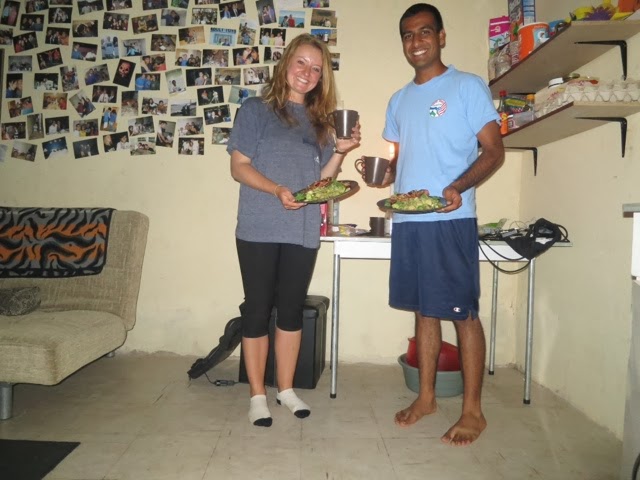I have now been in Lesotho for one year and three months
with one year remaining left of my service. In this post, I am going to depict
what has
technically changed.
I have seen two groups of Peace Corps Volunteers go. The
CHED 11 and ED 12 have left us. The ED 12 volunteers are the ones who trained
us, and basically mentored us through our first year, always giving their
interesting perspectives on life in Lesotho. Both groups gave us little tidbits
on how to deal with winter, how to hitch from town to town, and most
importantly how to open a quart of beer with another quart. It is kind of weird
with them gone.
I used to have a cat. Then it got eaten. Its name was Ghost.
Now it is a ghost. Now I have a dog. It was the one who ate the cat. I call it
Chompy.
I have seen two groups of Peace Corps Volunteers come. The
HY 13 and ED 14 have come as fresh faces with all the awe and excitement that
we all come into Lesotho in our first year. Everything is new and entertaining.
The very first day I was at the ED 14 training, a fellow trainee was elated to
see a child riding a donkey and documented the event by camera. It was
infectiously energizing to hear all the questions and ideas of their future
service. I am really looking forward to getting to know many of them in the
following year. I am also excited to finally be among the expert (old)
volunteers.
When I give handshakes, I can’t help but do it the Mosotho
way. I even hold hands with BoNtate now just because it seems so normal.
I have completed a full year of teaching. I work at school
from 8am-4pm every weekday and therefore accumulated 1520 hours of school time.
Each week, I teach 23, 40-minute periods of math or science. Therefore in the
1520 hours I was at school, I have taught 583 hours. My hourly pay for being at
school is 17.4 Rand per hour or $1.74 per hour. I have been on school field
trips, visited many other schools, given out marked over 1,080 official exams
for my four classes. Teaching is an extremely tiring, and rewarding job. I was
a new teacher this past year, but now I know how things work and I am more than
ready to handle this upcoming school year. The Legend of Sir Shawn lives on.
I have been sick, pretty intensely. I had intestinal
bacteria, and essentially died for two weeks. It was partially because I was
too stubborn to ask for help, or take medicine. I think if I am ever sick
again, I won’t hesitate to call our Peace Corps Medical Office for assistance.
I have become quite excellent at Sesotho. In the beginning I
would struggle, and often say absurdly incorrect things like, “I speak Sesotho
like a Vagina” instead of “like a baby.” The words are quite similar. But now I
feel confident enough to hold conversations with a variety of people on varying
levels. Now when I am in taxis and Basotho think of me as the “lehooa” (white
person) who doesn’t know Sesotho, I confront them with a witty Sesotho idiom
such as, “you eat the wire” which means “you are crazy.” Then ignorant faces
become astonished ones, then enthusiastically elated. I now get defensive when
someone will ask me, or question if I know Sesotho.
I respond equally and to either Sir Shawn or Tebatso.
I have been through an unimaginable amount of media. I have
completed Avatar: The Last Airbender, Avatar: The Legend of Korra, Community,
Arrested Development, Death Note, Parks and Recreation, The Office, Once Upon a
Time (I regret), Futurama, Heroes, Modern Family, The Mindy Project, Newsroom,
The Walking Dead, and True Blood. I cannot mention all the movies I have
watched, but there have been plenty. Life with a solar setup is quite grand; I
would recommend volunteers to invest in one in their country of service. I am
only realizing now that I apparently watch way too many animated shows.
I have travelled to many different locations. My first
vacation was in Port Elizabeth with a few Peace Corps friends. I had a
competition for the Innovation Challenge in Pretoria. My father and I traveled
to Cape Town, Johannesburg, and Kruger National Park. I have been to eight out
of the ten districts in Lesotho, which include Mokhotlong, Butha Buthe, Leribe,
Berea, Maseru, Mafeteng, Mohale’s Hoek, and Thaba Tseka. I have yet to visit
Quthing and Qacha’s Nek. I have even hit up some important spots such as Sani
Pass (highest pub in Africa), and Tsehlenyane (triple pool waterfall).
I rarely cooked in the States, and now I am a pretty
creative chef. I have made casseroles, wontons and dumplings, samosas, plenty
of pasta sauces, breads, cookies, etc. Perhaps I will utilize these skills when
I return. This year, I plan on perfecting my newly attained abilities.
I have eaten at every restaurant in Maseru except one.
Lancer’s Inn here I come. Reviews are also to come.
Yes, this year has been a very good one.





































